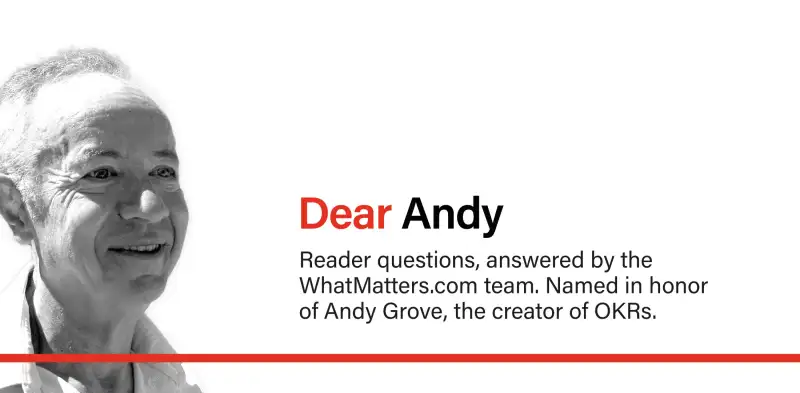Dear Andy,
I lead a team of about 15 creatives. We’ve used OKRs for the past two quarters, but haven’t really been able to make any significant progress. Mainly, we struggle in helping the team understand how their work can contribute to company goals. We’ve focused greatly on output-related Objectives and Key Results, but I’m worried this has been too abstract for team members. The Key Results we chose in the past are hard to influence directly by team members, making it understandably hard to turn to concrete actions.
I would love some tips on how to make our OKRs more direct and actionable.
Our past OKR:
O: Publish content that builds trust with our users.
K1: Increase median rate of engagement to X%.
K2: Increase the number of unique views by X% on published content pieces.
Sincerely,
Sebastian

Hi Sebastian,
Thanks for writing in!
We totally understand your team’s frustrations — let’s see what we can do to help them see themselves a bit more in their OKRs.
While it’s understandable to want to make Key Results (KRs) action-based, we’d advise caution. Remember, KRs shouldn’t look like a project plan, task list, or job description. They’re the measurements of growth or change that tell you where you are on your path to making your Objective a reality. The KRs should measure the results of the work, they’re not a description of the work itself.
That being said, while your current KRs are technically sound, if your team is consistently having trouble affecting the outcome, you may not be measuring the right thing. You’ve established “trust” as your most important point of focus. Why does engagement rate and unique views signal trust? What are other options that are under your team’s control? Methinks a brainstorming session may be in order.
One option might be to adjust the Objective itself. What if the Objective was something like “Build trust with our users” or even “Our users trust us to have the best information.” This takes the emphasis off of “publish content” (a “business as usual” output) and sets a loftier business outcome. The KRs developed can then become the direct answer to “How their work can contribute to company goals.” Asking, “What gains a user’s trust?" or “What is the best content?" end up becoming clues for the KRs. If team members are the ones answering those questions, they’re invested in the KRs, and they begin to see how they can impact the larger goal.
On another note, we’d like to commend you on your willingness to listen to your team and make adjustments accordingly. OKRs are most successful when everyone is passionately united behind a common goal, so kudos to you on recognizing how important team buy-in is. Keep on advocating for your team, my friend!
Well Sebastian, that’s all I have for you. Thanks so much for writing in and best of luck to you and your team on your OKR journey.
Sincerely,
Billy from the What Matters Team

Have a question for Dear Andy? Click here to submit your OKR queries.
